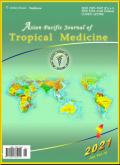COVID–19 vaccination and associated factors in Turkish healthcare workers practicing chest medicine
IF 1.6
4区 医学
Q3 PUBLIC, ENVIRONMENTAL & OCCUPATIONAL HEALTH
引用次数: 0
Abstract
Objective: To evaluate the COVID-19 vaccination status and related characteristics of Turkish healthcare workers practicing chest medicine. Methods: A cross-sectional online survey was conducted among the Turkish Thoracic Society members. The survey was started on May 17, 2021, and kept open for seven weeks. The 39-item survey included the COVID-19 vaccination status and demographic, clinical, and occupational characteristics. Results: Of 378 healthcare workers participated in the survey, 354 (93.7%) reported receiving at least one dose of the COVID-19 vaccine. A total of 323 (91.2%) healthcare workers received CoronaVac vs. BioNTech/Pfizer in 31 (8.8%). In the CoronaVac group, 77 (23.8%) contracted COVID-19 when not fully vaccinated, and 13 (4.0%) when fully vaccinated; however, 16 (51.6%) healthcare workers in the BioNTech/Pfizer group got COVID-19 when not fully vaccinated, but any fully vaccinated participants did not contract COVID-19 (P=0.003). Regarding vaccine dosing, 328 (86.8%) were fully vaccinated, while 50 (13.2%) were not. Multiple regression analysis for being a non-fully vaccinated healthcare worker demonstrated a significant relationship with having any SARS-CoV-2 infection history (adjusted OR 9.57, 95% CI 3.93-23.26, P<0.001) and being a non-physician healthcare worker (adjusted OR 5.86, 95% CI 2.11-16.26, P=0.001), but a significant negative relationship with full-time working at the time of survey (adjusted OR 0.13, 95% CI 0.03-0.56, P=0.006). Conclusions: Although a majority of healthcare workers were fully vaccinated, occupational and non-occupational characteristics were related to being non-fully vaccinated. Active surveillance regarding the COVID-19 vaccination in healthcare workers is necessary to address specific parameters as barriers to vaccination.土耳其从事胸科医学的医护人员接种新冠肺炎疫苗及其相关因素
目的:了解土耳其胸科医护人员COVID-19疫苗接种情况及相关特点。方法:对土耳其胸科学会会员进行横断面在线调查。该调查于2021年5月17日开始,持续了7周。调查内容包括COVID-19疫苗接种状况、人口统计学、临床和职业特征。结果:参与调查的378名医护人员中,354名(93.7%)报告接种了至少一剂COVID-19疫苗。31年共有323名医护人员(91.2%)接受了CoronaVac,而BioNTech/辉瑞(8.8%)接受了CoronaVac。在CoronaVac组中,77人(23.8%)在未完全接种疫苗时感染了COVID-19, 13人(4.0%)在完全接种疫苗时感染了COVID-19;然而,BioNTech/Pfizer组的16名(51.6%)医护人员在未完全接种疫苗时感染了COVID-19,但任何完全接种疫苗的参与者都没有感染COVID-19 (P=0.003)。在疫苗剂量方面,328人(86.8%)完全接种了疫苗,50人(13.2%)没有接种。多元回归分析显示,未完全接种疫苗的卫生保健工作者与是否有SARS-CoV-2感染史(调整后的OR为9.57,95% CI为3.93-23.26,P<0.001)和非医师卫生保健工作者(调整后的OR为5.86,95% CI为2.11-16.26,P=0.001)有显著的负相关,但与调查时的全职工作有显著的负相关(调整后的OR为0.13,95% CI为0.03-0.56,P=0.006)。结论:尽管大多数卫生保健工作者接种了完全疫苗,但职业和非职业特征与未接种完全疫苗有关。有必要对卫生保健工作者的COVID-19疫苗接种情况进行积极监测,以解决作为疫苗接种障碍的特定参数。
本文章由计算机程序翻译,如有差异,请以英文原文为准。
求助全文
约1分钟内获得全文
求助全文
来源期刊

Asian Pacific journal of tropical medicine
PUBLIC, ENVIRONMENTAL & OCCUPATIONAL HEALTH-TROPICAL MEDICINE
CiteScore
4.00
自引率
9.70%
发文量
1936
审稿时长
3-8 weeks
期刊介绍:
Asian Pacific Journal of Tropical Medicine (ISSN 1995-7645 CODEN: APJTB6), a publication of Editorial office of Hainan Medical University,is a peer-reviewed print + online Monthly journal. The journal''s full text is available online at http://www.apjtm.org/. The journal allows free access (Open Access) to its contents and permits authors to self-archive final accepted version of the articles on any OAI-compliant institutional / subject-based repository.
APJTM aims to provide an academic communicating platform for international physicians, medical scientists, allied health scientists and public health workers, especially those of the Asia-Pacific region and worldwide on tropical medicine, infectious diseases and public health, and to meet the growing challenges of understanding, preventing and controlling the dramatic global emergence and re-emergence of infectious diseases in the Asia-Pacific.
The journal is proud to have an international and diverse editorial board that will assist and facilitate the publication of articles that reflect a global view on tropical medicine, infectious diseases and public health, as well as emphasizing our focus on supporting the needs of public health practitioners. The APJTM will allow us to seek opportunities to work with others who share our aim, and to enhance our work through partnership, and to uphold the standards of our profession and contribute to its advancement.
 求助内容:
求助内容: 应助结果提醒方式:
应助结果提醒方式:


